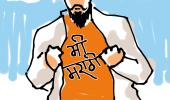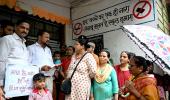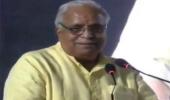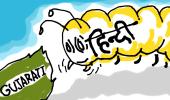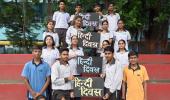'Let's see how this love story shapes up in the run up to the municipal corporation election.'

As Raj Shrikant Thackeray and Uddhav Balasaheb Thackeray, the two 'estranged' cousins prepare to share the stage at the sprawling NSCI Dome in Worli, central Mumbai, to celebrate Marathi Vijay Diwas on July 5, following the Maharashtra government's decision to scrap a contentious order making Hindi a compulsory third language in the state's primary schools, not just the Bharatiya Janata Party and its allies but the most potent of all -- the Marathi manoos -- too will watch with abated breath for signals that could bring in the beginning of a new political alliance in the state.
According to political observers in Maharashtra, the event promises to be more than a cultural gathering: "It could become a political moment that tests whether the cause of Marathi pride is strong enough to temporarily unite estranged cousins, Uddhav and Raj Thackeray," says an activist who has played a significant role in creating a narrative against 'Hindi imposition' in the state.
Over the past month, Maharashtra politics has been gripped by debates over the government resolution that sought to introduce Hindi from Class 1 to Class 5. The backlash was swift.
Marathi organisations, educational bodies and political parties across the spectrum raised alarms about the impact on Marathi identity and the added burden on young students.
It didn't take long for the controversy to spiral into a larger question of regional pride, language rights, politics and who truly stands for the Marathi manoos, on whom the two Thackerays are broadly pinning hopes of a political revival.
Seizing a Cultural Cause?
Among the first to sense an opportunity were Uddhav Thackeray and Raj Thackeray, leaders of the Shiv Sena (UBT) and Maharashtra Navnirman Sena respectively, who have often competed bitterly for the same Marathi vote bank since Raj Thackeray formed his political outfit in 2006.
Both quickly condemned the government resolution, even though, "the MNS has been hogging all the limelight as a crusader against Hindi imposition," adds a political analyst.
In their attempt to gain political mileage out of a cultural cause, Uddhav directed his party workers to prepare for statewide agitations and even threatened symbolic acts like burning copies of the government resolution outside the legislature.
Raj went a step further, accusing the government of trying to insult Maharashtrians in their own state.
Recently, both the MNS and Shiv Sena (UBT) have even justified use of violence and intimidation against non-Marathi speaking people in the state on various pretexts.
"Those non-Maharashtrians staying here should not try to browbeat Marathi-speaking people or speak humiliatingly to Marathis," says a senior MNS functionary speaking about the violence unleashed on a Gujarati businessman from Thane's Mira Road by MNS workers.
A video showing four MNS workers repeatedly slapping the Gujarati businessman has gone viral but the MNS isn't apologetic.
"While we don't have any problem with Hindi or any other regional languages in India, in Maharashtra, people who have made the state their home should speak Marathi," adds the MNS functionary.
In another viral video, three non-Maharashtrian mobile shop owners/workers can be seen apologising to a Thane resident Kiran Jadhav and getting slapped by the latter, in front of former Shiv Sena (UBT) MP Rajan Vichare. Jadhav had a verbal fight with these three people over purchase of a SIM card when the three beat up Jadhav. The matter ultimately reached Vichare's doorstep.
While Vichare could not be reached for his comments, a Shiv Sena (UBT) leader brushed aside the fracas as "a usual thing that happens across the state every other day."
MNS spokesperson Sandeep Deshpande, however, says, "Whoever insults Marathi language or people will not be tolerated in Maharashtra. This dadagiri of migrants should stop. They are welcome here but they must learn to respect the local culture."
As protests over the alleged imposition of Hindi mounted, the Devendra Fadnavis-led government tried to defuse tensions by setting up a review committee. But the pressure was relentless.
Within days, Chief Minister Fadnavis announced the government resolution was being withdrawn, describing the decision as one made 'out of respect for the sentiments of the Marathi people.'
For Uddhav Thackeray, the withdrawal was more than just a policy reversal. Still sulking over Eknath Shinde's rebellion that split the undivided Shiv Sena vertically in June 2022 and the subsequent erosion of his party's leadership, it might prove to be political oxygen.
Speaking after the government climbed down, he declared, 'The matter is closed now. Hindi cannot be forced on Maharashtra.'
"The Shiv Sena (UBT) now believes that this episode is proof that only sustained, forceful assertion could protect Marathi language and culture," says the party's Lok Sabha MP.
Thackeray's close aide and Shiv Sena (UBT) Rajya Sabha MP Sanjay Raut described it more bluntly: 'This is a victory for the Marathi people. Even in the future, we will not allow any three-language policy to be imposed if it threatens Marathi.'
Raj Thackeray, who many observers believe was first off the block publicly opposing the government resolution, wasted little time in framing the rollback as a direct result of public pressure stoked by his party's aggressive campaign.
'Had this morcha taken place, it would have revived the spirit of the Samyukt Maharashtra movement,' he said, referencing the historic agitation that led to the creation of the Marathi-majority state in 1960.
His message was unmistakable: This was not just a policy retreat but a reminder of Marathi assertion that could still shake governments.
Together, For Marathi

If all goes well, the two Thackeray cousins are preparing to stand side by side on the stage at the NSCI Dome. The event is pointedly stripped of party flags -- organisers say it is purely to honour the Marathi language. Yet few in Maharashtra's political circles miss the strategic calculation.
"Both Uddhav and Raj have seen their political bases fragment in recent years -- Uddhav after losing his party's name and symbol to Eknath Shinde, and Raj after repeated election disappointments. By co-owning this victory on a deeply emotional issue, they hope to reconnect with Marathi voters ahead of critical municipal elections, especially in Mumbai where both have much at stake," says veteran journalist and political observer Vivek Bhavsar.
Meanwhile, the Fadnavis government is trying to present the climb down as proof of responsive governance rather than weakness. A senior minister from the Shinde camp, speaking informally, insisted the original goverment resolution followed an expert committee's recommendations.
"Since it created unnecessary fears, we withdrew it completely. There is no question of disrespecting Marathi. We are all sons of this soil," he says.
Fadnavis himself argued that the decision showed they placed Marathi first. 'We respect Marathi people's sentiments. That's why we scrapped it. A new committee under Dr Narendra Jadhav will now study language policy thoroughly.'
The Congress, too, is watching closely, quickly branding the episode an embarrassment for the ruling alliance. Though, the party has not jumped directly into this agitation against 'Hindi imposition', a senior state Congress leader suggested that the entire fiasco revealed how "the BJP's overreach on Hindi" was curbed by local realities.
"It also gives Uddhav and Raj a perfect platform to reclaim the Marathi issue and the Marathi manoos. The impact of the Marathi Vijay Diwas will be clearly seen during the forthcoming municipal corporation elections in the state," the Congress leader notes.
A Sentiment That Runs Beyond Parties

At the ground level, the issue has struck a chord far beyond party lines.
In Malad in north west Mumbai, 68-year-old retired textile mill worker Suresh Gawde, who will attend the July 5 celebrations, says, "I still remember stories from my parents about the Samyukt Maharashtra struggle. Today it feels like someone is finally listening to the Marathi manoos again. Hindi is a beautiful language, but Marathi is who we are and we will not let anybody change this."
Educational groups that first raised concerns argued their opposition was based on practicalities as well as pride. Several principals and parent associations feared that introducing Hindi from Class 1 would strain already overstretched primary curriculum, affecting the learning of core subjects and Marathi itself.
For the Thackerays, the upcoming rally is a rare moment to share the stage not as rivals, but as defenders of a common cause -- the Marathi bhasha and Marathi asmita (pride).
Sandeep Deshpande of the MNS admits there was quiet coordination behind the scenes to keep Saturday's celebration above party lines. "This is for Marathi. Everyone agreed we won't bring party flags. The fight united all Marathi people, and the event should too."
Temporary Truce or Political Reset?
The big question the answer to which everyone is trying to decipher is whether this newfound unity between Uddhav and Raj -- the famous 'estranged Thackeray cousins' -- lasts beyond this episode or turns out to be a passing phase.
Political analysts caution that both have previously found it easier to align on emotive issues than to forge lasting electoral partnerships. Yet for now, the image of the Thackeray cousins standing together is a powerful one -- signalling that despite years of splits and rivalries, the call of Marathi pride can still over-ride personal feuds, at least temporarily.
"Let's see how this love story shapes up in the run up to the municipal corporation election. That is when one will come to know if the bonhomie between the two Thackeray brothers has percolated among their cadres many of whom would have their ambition to run for corporation elections cut to size if the MNS-SS (UBT) alliance takes shape formally and they decide to fight the elections jointly," says another observer of Maharashtra politics.
As the NSCI Dome readies to host thousands waving saffron cultural flags and chanting the anthem-like slogan 'Jai Maharashtra,' the big question on everybody's mind will be: Will this nascent Marathi resurgence simply end with the rollback of one unpopular decision, or become the start of a broader political comeback for the Thackeray cousins.
For many in the crowd, the answer will matter not just for Saturday's celebration, but for the future direction of Maharashtra's politics.

